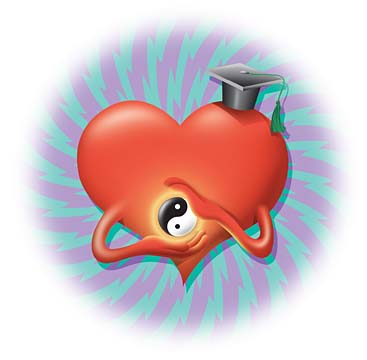
|

|
Yin and yang
of leadership
Good decision making
has to come from the heart
In her book "The Chalice and the Blade: Our History and Our Future," Riane Eisler reminds us that our brains are designed to continuously root out and incorporate ways we can control, subdue and master our life's many challenges.
This "dominator model" -- fueled as it is by our IQs -- is absolutely essential to leadership competencies having to do with problem solving, strategic planning and the like.
However, successful leadership, as we are increasingly being willing to accept, is fueled by much more that just IQs, more than cognitive abilities. The single most influential factor causing high-potential, high-IQ young leaders to become derailed is their inability to form and maintain successful interpersonal relationships.
The key elements of a "partnership model" are respect, openness, cooperation and harmony. These qualities are what fuel our EQs -- our emotional intelligence quotient. And this form of intelligence is not housed in the mind. It is housed in the heart.
Efforts aimed at leadership development, if they are going to be successful, must therefore be two-pronged. They will require a "yes" and not an "either-or" mind-set.
Let us examine some the challenges this involves:
Think for a moment about the typical imagery we use when cognitive learning -- when increasing or using our IQs -- is the issue. We "cram" or "force feed" for an exam. We "pore" over documents. We "brain storm" ideas. We "attack" and try to "master" a problem.
See the pattern?
We try to "yang" it into submission.
And there is absolutely nothing wrong or inappropriate about this -- when IQ is what we are striving to develop, access or apply.
However, when EQ is what we are striving to develop, applying, these same strategies will not work and will reduce the probability that the needed strategies become available.
If we attempt to "attack," "storm," or try to "master" our hearts, we will only succeed in closing them down, in making their doorways thicker.
When this happens, we say a person has become "thick-skinned," "cold-hearted" or, worse yet, "heartless."
Leaders will often unintentionally manifest this feeling of "heartlessness" (or more accurately a lack of feeling) to others. I stress unintentionally because I am not speaking of those who get their kicks out of being emotional or verbal bullies. I am speaking of leaders who think they are doing the "right thing" by, for example, "steeling themselves" before they have to tell someone they've been fired; of leaders who jump right to stressing the facts of "generous severance packages" without allowing "down-sized" employees to grieve; to leaders who seem to have forgotten that being a human being, with both a mind and a heart, came before being a stoic professional.
In order for the heart to develop and release the respect, openness, cooperation, and harmony that fuel the "partnership model" -- our EQs -- we are confronted with an inevitable Catch 22. We must "yin" the heart into respecting us, trusting us, opening up to us and co-operating with us. Feelings can't be "crammed" into the heart. The heart has to open itself to them.
EQ-related skills -- self-awareness, sensitivity, empathy -- cannot be fully developed by cognitive means only. In the same way, by analogy, we cannot spiritually learn to ice skate.
Take a good hard look at your own leadership development efforts, for yourself personally and for your entire organization.
How much time and energy is being invested in yang versus yin? Are dominator-oriented development strategies (reading, lectures, case analyses, PowerPoint displays) being used to help people secure IQ yang outcomes which are learned from the outside in?
Are partnership-oriented development strategies (coaching, experiential exercises, personal reflection, real-life relationships) being used in an attempt to acquire EQ yin-related outcomes which are facilitated from the inside out?
Don't be surprised if you discover a severe imbalance, if you find you and your organization's leadership development efforts of "over yanged and under yinned."
Or if you find that brain-related strategies of learning have been confused with heart-related needs for facilitation.
You won't be alone.
which specializes in executive leadership development.
Reach him at temenos@lava.net.
E-mail to Business Desk
[News] [Business] [Features] [Sports] [Editorial] [Do It Electric!]
[Classified Ads] [Search] [Subscribe] [Info] [Letter to Editor]
[Feedback]
